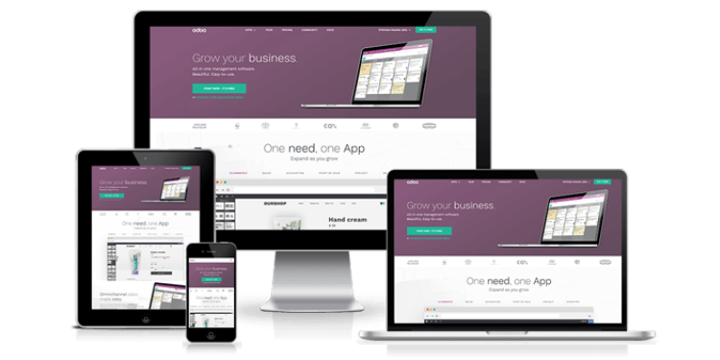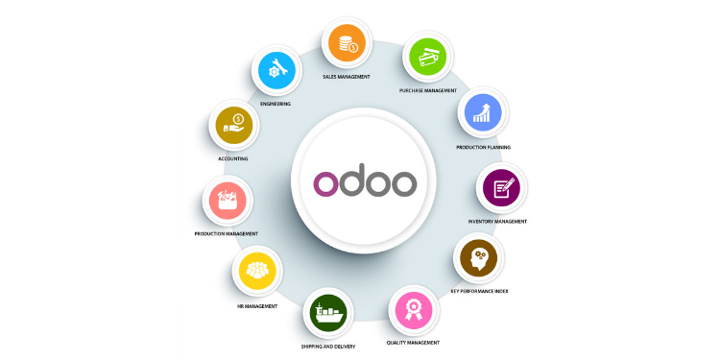Odoo is an open-source ERP (Enterprise Resource Planning) software platform written in Python. It was previously known as OpenERP before rebranding to Odoo in 2014.
Odoo is a comprehensive suite of business applications that can help businesses of all sizes to manage their operations more efficiently.
The platform includes CRM, e-commerce, accounting, human resources, and inventory management modules, among others.
In this blog, we will delve into what Odoo is, its features, how it works, and its benefits.
What is Odoo?

Odoo is a complete suite of business applications designed to help businesses manage their operations more efficiently.
The platform offers a modular functionality approach, meaning businesses can add or remove modules based on their specific needs.
Odoo is built on a client-server architecture, with the server component running on a web server and the client component running in a web browser.
The server component is responsible for storing data and managing business logic, while the client component provides a user-friendly interface for accessing that data.
ERP for leather industry what is odoo in python, what is odoo python, what is odoo ERP system
Odoo Offers A Range of Features

- A modular approach to functionality that allows businesses to add or remove modules based on their specific needs.
- A range of applications that can be used to manage a variety of business processes, including sales, marketing, accounting, inventory management, and HR.
- Customizable dashboards that provide a real-time overview of key business metrics.
- Integration with a range of third-party applications, including payment gateways, shipping providers, and e-commerce platforms.
- Multi-language and multi-currency support.
- A user-friendly interface that can be easily customized to meet the needs of individual users.
- Access to a community of developers who contribute to the platform's ongoing development.
Don't Just Read About Success,
Take the Next Step
Let's Schedule a Consultation Meeting
benefits of odoo, ERP software for leather industry features of odoo, what is odoo system and what is odoo software
How Does Odoo Work?

Odoo is built on a client-server architecture, with the server component running on a web server and the client component running in a web browser.
The server component is responsible for storing data and managing business logic, while the client component provides a user-friendly interface for accessing that data.
The server component is built on top of the Python web framework, which provides a range of features for building web applications, including database connectivity, URL routing, and templating.
The server component also includes a range of modules that provide functionality for managing specific business processes, such as sales, accounting, and inventory management.
The client component is built using HTML, CSS, and JavaScript and is designed to be compatible with all modern web browsers.
The client component provides a user-friendly interface that allows users to access and interact with the data stored on the server component.
When a user interacts with the client component, the client sends requests to the server component using the HTTP protocol.
The server component processes these requests, retrieves the required data from the database, and returns a response to the client. The client then displays the response to the user in the form of a web page.
Customizable Dashboards:
Odoo's customizable dashboards provide a real-time overview of key business metrics, including sales, expenses, and inventory levels.
Businesses can customize their dashboards to display the information that is most relevant to their operations.
Modular Design:
Odoo's modular design means that businesses can start with just one module and add more as their business grows.
This approach allows businesses to scale their operations gradually and avoid investing in functionality they don't need.
Range of Applications:
Odoo includes a wide range of applications that can be used to manage various aspects of a business, including sales, marketing, accounting, inventory management, and HR.
These applications are designed to work together seamlessly, allowing businesses to manage their operations more efficiently.
Integration with Third-Party Applications:
Odoo integrates with a range of third-party applications, including payment gateways, shipping providers, and e-commerce platforms.
This allows businesses to streamline their operations and avoid duplicating data entry in multiple systems.
Multi-Language and Multi-Currency Support:
Odoo supports multiple languages and currencies, making it an ideal platform for businesses operating in multiple countries.
This functionality allows businesses to manage their operations more efficiently and to provide a better customer experience to their international customers.
User-Friendly Interface:
Odoo's user interface is designed to be user-friendly and easy to navigate.
The interface can be customized to meet the needs of individual users, allowing businesses to provide their employees with an interface that is tailored to their specific job functions.
Access to a Community of Developers:
Odoo has a large community of developers who contribute to the platform's ongoing development.
This community provides businesses with access to a wealth of knowledge and expertise that can be used to customize the platform to meet their specific needs.
Benefits of Odoo

Cost-Effective:
Odoo is an open-source platform, which means that businesses can use it for free.
This can be a significant cost-saving for small and medium-sized businesses that may not have the resources to invest in expensive ERP software.
Scalability:
Odoo's modular design allows businesses to start small and add more functionality as their business grows. This approach makes it easy for businesses to scale their operations without having to switch to a different software platform.
Odoo is highly customizable, allowing businesses to tailor the platform to meet their specific needs. This can be a significant advantage for businesses that have unique requirements or workflows.
Integration:
Odoo's integration capabilities allow businesses to streamline their operations by integrating with other systems and applications.
This can help businesses to avoid duplicating data entry in multiple systems, saving time and reducing errors.
User-Friendly Interface:
Odoo's user-friendly interface makes it easy for businesses to train their employees to use the platform. This can help to reduce training costs and improve productivity.
Real-Time Data:
Odoo's dashboards provide businesses with real-time data, allowing them to make informed decisions based on up-to-date information.
Community Support:
Odoo has a large community of developers who contribute to the platform's ongoing development.
This community provides businesses with access to a wealth of knowledge and expertise that can be used to customize the platform to meet their specific needs.
Conclusion
Odoo is a comprehensive suite of business applications that can help businesses of all sizes to manage their operations more efficiently.
The platform's modular approach to functionality allows businesses to add or remove modules based on their specific needs, making it highly customizable.
Odoo's integration capabilities, multi-language and multi-currency support, and real-time dashboards provide businesses with the tools they need to manage their operations more effectively.
The platform's user-friendly interface and access to a community of developers also make it an attractive option for businesses looking to streamline their operations and improve their bottom line.
Overall, Odoo is a powerful tool that can help businesses to scale their operations and achieve their goals.
what is odoo system, what is odoo software, what is odoo erp system, odoo software, what is odoo python,benefits of odoo software
Don't Wait for the Right Time,
Let's Talk & Implement it
Let's Schedule a Consultation Meeting